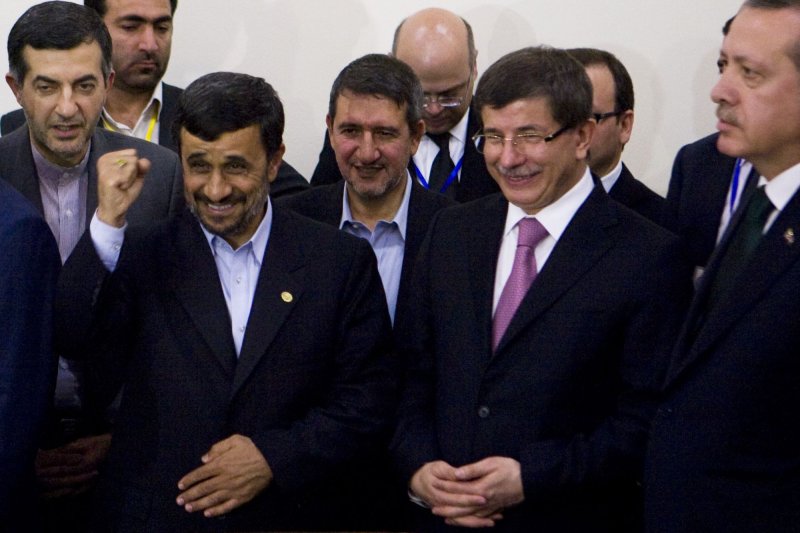Iranian President Mahmoud Ahmadinejad poses for media as Turkish Foreign Minister Ahmet Davutoglu stands on his left side during signing agreement after Iran, Turkey and Brazil signed an agreement to ship Iran's low-enriched uranium to Turkey in exchange for fuel for a nuclear reactor in Tehran, Iran, on May 17, 2010. Iran signed an agreement to swap its uranium in Turkey for enrichment, hoping to avert new international sanctions. Brazil helped broker the deal. UPI/Maryam Rahmanian |
License Photo
UNITED NATIONS, June 9 (UPI) -- Iranian President Mahmoud Ahmadinejad Wednesday shrugged off new sanctions imposed by the U.N. Security Council over his country's nuclear program.
Ahmadinejad, currently on a trip to Tajikistan, said the international community's latest effort to pressure Iran to throttle back its nuclear ambitions won't harm Iran, the Iranian news agency IRNA reported. He said nations possessing nuclear weapons "now resort to the pretext that Iran might in the future manufacture atomic bombs and pass resolutions against us every now and then."
"I sent a message to one of them, telling him 'These resolutions that you pass resemble used napkins that need to be thrown to the garbage can,'" IRNA quoted Ahmadinejad as saying.
"They are not capable of inflicting any damage against the Iranian nation."
Twelve of the 15 nations on the Security Council voted for the resolution, Turkey and Brazil voted against it and Lebanon abstained, The New York Times reported.
The vote sets the stage for harsher restrictions promised by the United States and the European Union on their own once the United Nations took action, officials said. European leaders indicated they likely would discuss new measures during a summit this month.
Germany and the five permanent Security Council nations -- Britain, China, France, Russia and the United States -- that negotiated the new sanctions left the door open to diplomacy.
The sanctions target the Revolutionary Guards Corps and Iran's military and nuclear industries, as well as blacklist 41 additional entities, the Times reported.
The sanctions would hamper the nuclear industry, impose an embargo on sales of heavy weapons and push for ship inspections, diplomats said. Key Western powers, however, differ about the strength of the sanctions.
U.S. Secretary of State Hillary Clinton, in Ecuador for a meeting with President Rafael Correa, called the fourth round of sanctions "the most significant sanctions that Iran has ever faced," the BBC reported.
Before the vote, Ahmadinejad warned his country would not agree to nuclear talks if the sanctions are imposed and said a nuclear fuel-swap deal brokered by Iran, Turkey and Brazil was a one-time offer that could disappear with new sanctions.
Iran agreed in May to deposit low-enriched uranium with Turkey in return for reactor fuel. The United States and its allies said the agreement was too little too late.
The Kuwaiti news agency KUNA reported Iranian Foreign Ministry spokesman Ramin Mehman-Parast called the sanctions a "wrong move that will merely complicate the situation even further."
"These countries did not learn from their past mistakes and will not achieve anything from this decision," he said.















